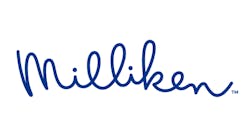It's been a "disappointing" year for safety at Milliken & Co.'s New Holland Plant in Gainesville, Ga.
That was what plant manager Jared Morgan told visitors from the America's Safest Companies Conference during a tour in late October. At the time of the tour, the Milliken yarn-manufacturing facility had experienced two recordable injuries year-to-date, translating to a recordable-incident rate of 0.7.
Even though the EHS profession is dedicated to attaining the noble goal of zero workplace injuries, the reality is that accidents happen. The fact that Milliken's New Holland Plant isn't satisfied with a 0.7 recordable rate speaks volumes about the facility's commitment to zero.
A little history might help explain why two injuries (one was a slip, the other was a pinch) garner management's full attention.
Since the New Holland Plant opened in 1902, the 750,000-square-foot facility has survived a direct hit from a tornado and weathered a flood of imported textiles. But heading into the early 1980s, the plant's poor safety record threatened to undermine the facility's rich history. In 1981, Morgan noted, the New Holland Plant was averaging one recordable incident per week.
After a reexamination of the facility's safety policies, procedures and culture, the New Holland Plant has been on a positive trajectory ever since. The facility had a recordable rate of 0.0 in 2009 and 2010, and a rate of 0.4 in 2012.
The facility's push to revitalize its safety program fit into a corporatewide effort that has established Spartanburg, S.C.-based Milliken as a model of safety excellence. EHS Today named Milliken one of America's Safest Companies in 2004 and 2010, and all Milliken sites have earned VPP certification (the New Holland Plant was certified in 1996). After being approached by a major manufacturer in 2006 for help with operational execution, Milliken created a consulting arm to share its safety and continuous-improvement methodologies and best practices.
At the New Holland Plant, the foundation of safety is the plant's 230 associates. The facility makes that clear in its mission statement, which explains that the plant's goal is "to generate a safe work environment through promoting enthusiasm and participation from all New Holland associates, accomplished through developing an attitude of individual responsibility and safety awareness both on and off the job."
The plant's onboarding process gets new associates engaged in safety right away. Every new associate automatically is a member of the new-hire safety team. Members of the team earn points by participating in activities such as behavior-based audits, risk-reduction projects and attending the team's weekly meetings. New hires must earn a minimum number of points by certain milestones (90 days, six months, etc.) to stay employed.
"Involvement in the safety process is mandatory," Morgan said.
In addition to the plant's safety-awareness steering committee, the plant has eight subcommittees that focus on various safety issues within the plant. Three of those subcommittees were formed this year: health and wellness; morale; and new-hire safety.
Among other best practices, the New Holland Plant:
- Tracks near misses and other leading indicators.
- Begins every meeting in every department with a discussion on safety.
- Uses Liberty Mutual risk-ranking criteria to prioritize risk-reduction projects.
Also noteworthy is the plant's zero-tolerance policy for certain actions, such as using a cellphone while operating a powered vehicle. The cellphone policy is one of six "Safety Absolutes," which also include:
- Any violation of lockout/tagout procedures on machinery or trailers.
- Operating any powered vehicle without being licensed or operating any walking powered vehicle without steel-toe protection.
- Unauthorized use of a knife and/or not wearing the proper PPE while using an authorized knife.
- Placing your hands in moving rollers or pinch points while a machine is running.
- Now earing the proper PPE in the laydown area.
Associates must sign a form stating that any violation of the Safety Absolutes is grounds for termination. At the bottom of the form is this quote: "Asking me to overlook a simple safety violation would be asking me to compromise my entire attitude toward the value of your life."
